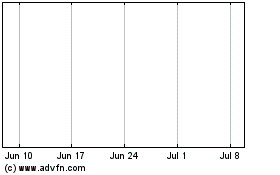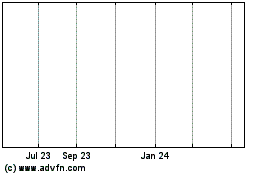By Rob Copeland and Patrick Thomas
Google reached a deal to buy wearable fitness products company
Fitbit Inc. for roughly $2.1 billion, a move that intensifies the
battle among technology giants to capture consumers through devices
other than smartphones.
For Google, the deal marks a further push into health as it
faces regulatory threats to its massive internet-search and
advertising business. It also puts Google in renewed and direct
competition with Silicon Valley neighbor Apple Inc., which in the
past week said rising sales of wearables and related services were
becoming a bigger driver of its business.
Google's parent Alphabet Inc. will spend just a sliver of its
$121 billion cash hoard to branch out with Fitbit's products.
Alphabet's $2.1 billion bid was for $7.35 a share in cash, a 19%
premium to Fitbit's closing price Thursday and more than 70% above
where the stock was trading last week before deal talks were first
reported by Reuters.
Fitbit shares rose more than 15% to $7.14 on Friday, while
Alphabet's shares ticked up slightly.
The deal lands at a moment when Google and other tech giants are
under scrutiny on a number of fronts over their competitive
practices and dominance of certain businesses, including through
acquisitions. But the Mountain View, Calif., company continues to
expand aggressively.
Founded in 2007, Fitbit makes so-called wearables, or watches
and bracelets that primarily track health information like heart
rate. Such products have fascinated Silicon Valley, where
technology executives of all ages proudly wear rings and other
devices to track sleep and "hack" their own personal
performance.
Wearables have proved far less popular with the broader public.
Google several years ago launched a brand of smart glasses that
attracted as much ridicule as buyers, and Snap Inc. likewise got a
lukewarm response to its hyped Spectacles line.
Fitbit traded for $45 soon after it went public in 2015, but the
stock has cratered in the past few years as the company ceded
market share to Apple and its smartwatch.
With its fitness offerings, Fitbit collects myriad and personal
data on users that it in turn uses to suggest exercises and other
lifestyle changes. And its sale is bound to raise issues around
consumer privacy. In announcing the acquisition, Google said it
wouldn't use Fitbit data to help power its massive online
advertising business.
"Similar to our other products, with wearables, we will be
transparent about the data we collect and why," Rick Osterloh, the
head of Google's hardware division, said in a statement. "We will
never sell personal information to anyone. Fitbit health and
wellness data will not be used for Google ads. And we will give
Fitbit users the choice to review, move, or delete their data."
Apple in many ways is a model for what Google hopes to
accomplish.
While the Apple Watch was initially a disappointment, sales have
picked up lately; and the company's AirPods were an immediate hit.
The iPhone maker said on Wednesday that sales in its wearable
business soared 54% in the latest quarter.
Facebook is also in the wearables mix. This fall the
social-media giant reached a deal to buy CTRL-Labs Inc., a startup
that develops devices that can interface with the brain.
"We're talking about data that used to be impossible to collect
on a mass scale," Craig Hallum analyst Alex Fuhrman said. "Only
since the beginning of the Fitbit era have consumers been walking
around with wearables that monitor their heart nearly 24 hours a
day."
Google's hardware line for now consists mostly of slow-selling
products like the Chromebook laptop and Pixel smartphone.
Google has spent billions on targets like HTC Corp., a
smartphone maker, and Nest, a speakers company, with little to show
for it in sales, analysts say. Google doesn't break out financial
performance for its hardware division.
It hired Mr. Osterloh, a former Motorola president, in 2016 to
steer the nascent unit. In an interview with The Wall Street
Journal last month, Mr. Osterloh often referred to the hardware
division as a "startup" within the conglomerate.
"I think eventually this will be a very large, important
business," he said.
Some observers remain skeptical. "The acquisition is another
example of Google tilting at windmills" in hardware, analysts at
Wedbush Securities wrote in a report Friday. "Google is uniformly
bad at consumer products in our view, and appears to us to be
intent on spending whatever it takes to prove our view wrong."
Fitbit says it has sold more than 100 million devices world-wide
since its founding, and currently has more than 28 million active
users.
"Google is an ideal partner to advance our mission," said James
Park, a Harvard University dropout who co-founded Fitbit. "With
Google's resources and global platform, Fitbit will be able to
accelerate innovation in the wearables category, scale faster, and
make health even more accessible to everyone," he said in a
statement.
The deal is expected to close next year, the companies said.
Fitbit's results have been pressured in recent months. In July,
it lowered its full-year revenue outlook after weaker-than-expected
sales of its new smartwatch model, Versa Lite. The smartwatches are
aimed at competing with popular offerings from Apple and Samsung
Electronics Co.
Still, the company reported narrower losses in the second
quarter as sales of its fitness trackers jumped 51% and the health
division showed some strength. Fitbit is scheduled to release its
third-quarter earnings report Nov. 6.
--Sarah E. Needleman contributed to this article.
Write to Rob Copeland at rob.copeland@wsj.com and Patrick Thomas
at Patrick.Thomas@wsj.com
(END) Dow Jones Newswires
November 01, 2019 19:17 ET (23:17 GMT)
Copyright (c) 2019 Dow Jones & Company, Inc.
Samsung Electronics (PK) (USOTC:SSNHZ)
Historical Stock Chart
From Mar 2024 to Apr 2024

Samsung Electronics (PK) (USOTC:SSNHZ)
Historical Stock Chart
From Apr 2023 to Apr 2024
